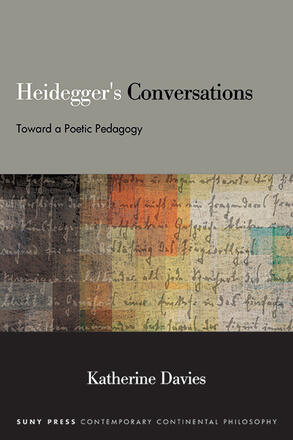
Heidegger's Conversations
Toward a Poetic Pedagogy
Offers the first comprehensive study of Martin Heidegger's five conversational texts.
Description
Reading Martin Heidegger's five conversational texts together for the first time, Heidegger's Conversations elaborates not only what Heidegger thought but how he did so by attending to the philosophical possibilities of the genre of these under-studied texts written between 1944 and 1954. Though he wrote little on the topic of teaching and learning explicitly, Katherine Davies shows Heidegger performed an implicit poetic pedagogy in his conversations that remains to be recognized. Heidegger launched an experimental attempt to enact a learning of non-representational, non-metaphysical thinking by cultivating a distinctly collaborative sensitivity to the call of the poetic. Davies illustrates how each conversation emphasizes a particular pedagogical element—non-oppositionality, making mistakes, thinking in community, poetic interpretation, and the dangers of such pedagogy—which together constitute the developmental arc of these texts. Whether Heidegger is revising or reinforcing his own earlier pedagogical practices, Davies argues that attending to the dramatic staging of the conversations offers a distinct vantage point from which to contend with Heidegger's philosophy and politics in the post-war period.
Katherine Davies is Assistant Professor of Philosophy at the University of Texas at Dallas.
Reviews
"In this first and most welcome examination of all five of Heidegger's 'conversational' texts (widely and perhaps misleadingly referred to as 'dialogues,' and including the as yet untranslated 'Western Conversation'), Katherine Davies addresses the crucial Heideggerian issue of the possible 'overcoming' of metaphysics in its manifestation as a development of a 'poetic pedagogy.' She shows convincingly that the five conversations contain a coherent and sustained reflection on pedagogy—teaching and learning—that calls for the five texts to be read seriatim. In a provocative but persuasive conclusion, she shows that Heidegger's own pedagogical practice fell woefully short of his own teaching." — Drew A. Hyland, author of Plato and the Question of Beauty
"Davies's detailed and careful readings of Heidegger's five dialogues sheds important light on Heidegger's understanding of pedagogy, metaphysical thinking, language, Gelassenheit, and much more. The result is a masterful work that contains something of interest for every Heidegger scholar." — Shane Ewegen, co-translator (with Julia Goesser Assainte) of Heraclitus: The Inception of Occidental Thinking and Logic: Heraclitus's Doctrine of the Logos